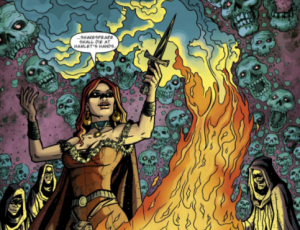Comics /
Spotlight /
Progressive Panels
Writing About Comics (Part One): Scholarly Exercise
By Andy Frisk
August 17, 2011 - 18:47
It’s something that we do here at The Bin, but what exactly does it mean to write about comics and what do we talk about when doing so? In part one of this look into my experience on writing about comic books we'll look at how writing about comics can be a scholarly exercise (something you’ll see plenty of here)..
Regular readers of The Bin’s articles will notice that there are many different types of articles, interviews, reviews, news alerts, and commentaries written here. Like most comic book sites, The Bin has risen up out of the dated fanzine model to become a respected comic book industry journalism site. We’ve expanded into regularly updated comic book industry related news coverage, launched several different columns penned by regular Bin columnists, and continue to offer coverage of movies, comic book movies, fan films, actions figures, and regular old-school monthly published comic book single issue reviews. There’s a little bit of everything here, and our writers are constantly coming up with new topics of discussion, ideas, and comments on the industry that often makes industry insiders and, most excitingly of all, several of the industry’s top writers and artists take notice and the join the ranks of our regular readers.
 |
| The classic scholar... |
Writing about comic books for a site like The Bin does not earn one financial reward. At the most some of us are lucky enough to get a few comps now and again from publishers, writers, and artists looking to get the word out on their newest book. We don’t get the notoriety that larger corporately run sites do. While a few of our members have moved on in the past to start their own sites, many of the core writers here at The Bin (myself included) write on a part time basis as time allows. We have full time jobs, familial obligations, and bills to pay. There would be nothing greater than being able to write about a subject that you love and make a living at it, but there are very few out there in the world of comics journalism who are even close to doing so. Writing about comic books, graphic novels, and manga/
manhwa does not afford one the financial benefits that a long tenured and well known movie critic reaps, for example. One might ask oneself, “Why write about comics?”
There is a very simple answer. Most comic book readers are passionate about their favorite medium. Comic books and graphic novels or, as scholars call them, works of sequential art, are a unique medium. They are a mixture of written word and drawn image, and as any reader of today’s comic books will quickly tell you, “Comic books aren’t just for kids anymore.” This does not mean that they are necessarily adult oriented as in one might say an “adult movie” is. This means that there are several works being published, by small presses dedicated to literary sequential art works to the big two mainstream publishers, that are complex, realistic, and thematically relevant to events in everyday society. Much like popular music has reflected and commented upon cultural themes and political attitudes of certain eras in American history like the music of the 1960s and early 1990s did quite powerfully, and in a way that made people sit up and pay attention to what was going on, comic books, graphic novels, and various other works of sequential art, due to the nature of their rapid publication and current writing, often comment even more specifically and articulately on the same subjects. For example, one only has to refer to the early Silver Age Marvel Comics books which highlighted their heroes battles against the Cold War Communist threat and the recent Marvel Comics mega-crossover event
Civil War which commented quite poignantly on the divisive politics of the Bush Administration during the early 2000s and the political fallout from the debate on safety vs. security after 9/11. These are but two examples of comic books reflecting and commenting on vast political and social debates and, in some cases, struggles. Comic books can also uniquely comment on past events from a current perspective in very poignant ways. Joe Kubert’s
Yossel: April 19 1943 is one such work. It tells a familiar story about the Holocaust in a different medium ripe with characteristics that manage to bring a new perspective to a horror that should never be forgotten. Political themes aren’t the only current and relevant themes that are addressed in sequential art works though that makes “comics not just for kids anymore.”
 |
| Classics re-imagined in a scholarly artistic way... |
The sequential art media has seen a recent increase in the number of biographical works that are being published by companies like Blue Water, who produce several short bios on political leaders and famous pop culture icons. Also, the recent publication by Fantagraphics Press of
21: The Story of Roberto Clemente by Wilfred Santiago has demonstrated that the sports bio can be done in a unique way by telling the story of major sports figures in sequential art form. The medium allows for unique ways to visualize not only the figure’s special talents on the field, court, or track, but to celebrate the joy of competition, agony of defeat, and glory of victory. Adaptations of works of written literature, like Franz Kafka’s
The Trial published by Sterling Publishing Co, Inc. and
Moby-Dick from Marvel Illustrated, (while never serving as a replacement for a reading of the original works) bring new insights into the works through their unique visualization of events of these stories. One must understand that this is the adapting author’s vision and is subjective to his or her reading of the source work, but these adaptations can open up whole new worlds of critical approaches to interpretation of the source novels and stories.
 |
| Marvel Illustrated's Moby-Dick |
So as is easily evident, writing about comics can be a rewarding experience in the aspect that for the serious reader, sequential art works can be as wonderfully complex and thought provoking as novels, short stories, and films. Scholars, students, and many everyday readers are passionate about these aspects of sequential art and comic books. Some of us are passionate about sharing our ideas with others in thought provoking ways as well. This complexity and thought provoking nature of sequential art can lead to equally wonderful intellectual inquires, debates, and discussions. This complexity also can lead to incredibly stimulating and enjoyable intellectual exercises. The Bin gives writers, like me, and others interested in these aspects of sequential art a place where we can freely and openly write, discuss, and debate, about our ideas on various works that we are interested in. The Bin also gives us the freedom to sometimes fail to make our points and a forum for our readers and co-writers to call us out on our failings (all in a good natured way, of course) like academics would in any scholarly journal. Such debate and communication is encouraged as this is the best way for one to learn, grow, and become better at his or her writing. The Bin is always looking for more writers likes this, but one does not have to have an educated background or interest in scholarly aspects of comic books to be enamored with or want to write about sequential art. Sometimes, a comic book can simply be, like their counterparts in written media and film, simple works of grand escapism. Sometimes a comic book story or a superhero character is just plain cool or fun to read. You’ll see this type of writing about comic books here at The Bin too, and we’ll look at what goes into this type of writing and reading next time.
Last Updated: January 17, 2025 - 08:20


